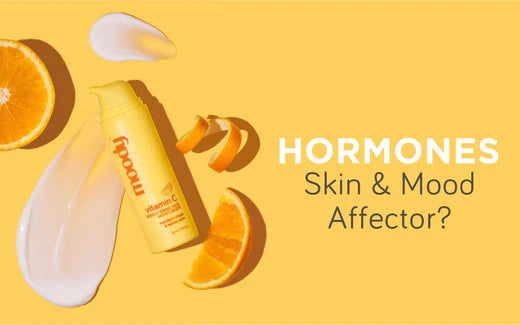

· By Suramya Jain
Hormones: Skin and Mood Affector?
chemicals travel around your bloodstream, telling tissues and organs what to do. But as powerful as
they are, they cause equal amount of chaos when they are not in balance i.e too much or too little of
one hormones. Imbalances in hormones can affect our physical health, as well as our mental health.
Hormonal Imbalance can happen irrespective of your gender. Here are a few warning symptoms that
indicate a hormonal imbalance:
- Sudden weight gain/loss
- Increased digestion issues
- Fatigue
- Skin dryness
- Weakness
- Increased urination
- Persistent thirst
- Body ache
- Hairfall
- Change in appetite
- Anxiety
- Mood swings
How Hormonal Imbalance Affects Skin?
1.Acne
Estrogen and progesterone are the two main hormones that influence your period cycle. Your monthly
menstrual cycle increases the production of sebum (skin’s natural oil), which clogs your skin pores and
causes acne. Mostly, acne caused by hormonal changes appears on the forehead, chin and nose. It can
be painful and cystic.
2. Under Eye Dark Circle
When your stress levels rise, the production of cortisol (stress hormone) increases. It leads to lack of
sleep at night and makes you feel restless. Constant tiredness and lack of sleep cause dark circles around
your eyes.
3. Dry Skin
Your skin may get excessively dry due to hormonal imbalance. If any reproductive hormones like
estrogen level fall, naturally, the sebum oil production decreases leading to dry skin. Your skin becomes
rough and flaky. Dry skin indicates essential fatty acids and other important nutrient deficiency.
4. Pale/Yellow Skin
Pale or yellow skin is considered to be a sign of either thyroid or diabetes. If your blood vessels go
through any changes due to hormonal imbalance, your skin appears pale and waxy. Mostly, the lower
part of your leg faces this issue. Pale skin can also indicate liver failure.
5. Pigmentation or Melasma
The increase and fluctuations of the reproductive hormones stimulate melanocytes in the skin. This
leads to darkened pigmentation patches appearing on the forehead, nose and cheeks.
6. Hair Loss
Most people lose about 50 to 100 strands of hair per day. However, what you may not consider is that
your hair loss may be a sign of a hormonal imbalance. Men may lose body and facial hair and both men
and women may experience scalp hair loss. Dihydrotestosterone (DHT) is similar to testosterone and can
impact hair. DHT can shrink hair follicles causing male and female pattern hair loss. In women, it is most
common during menopause. When estrogen and progesterone drop, hair can grow more slowly and
thin.
How Hormonal Imbalance Affects Mood?
Hormonal imbalance doesn’t just cause physical symptoms. It may also cause emotional, psychological
and mental side effects that change the way you think or feel. The stress of hormone changes may make
you more prone to anxiety and depression.
Some hormones are directly responsible for regulating moods: serotonin and dopamine. When these
hormones are being produced in proper amounts, it’s easier to control moods and regulate thought
processes. These are the primary hormones responsible with preventing depression and similar
emotional and mood disorders.
Estrogen and Testosterone are hormones that control and stabilize mood. When either of them is out of
normal balance, mood swings can occur. These mood swings can vary between active irritability or
aggressiveness and sluggish depression. At other times this imbalance results in high levels of anxiety as
well.
Thyroid hormones are also key to keeping energy levels high as well as regulating mood. By keeping cells
in the brain energized and functioning efficiently, your mood will be positively affected. When these levels are lower, mood will be lower as well.
